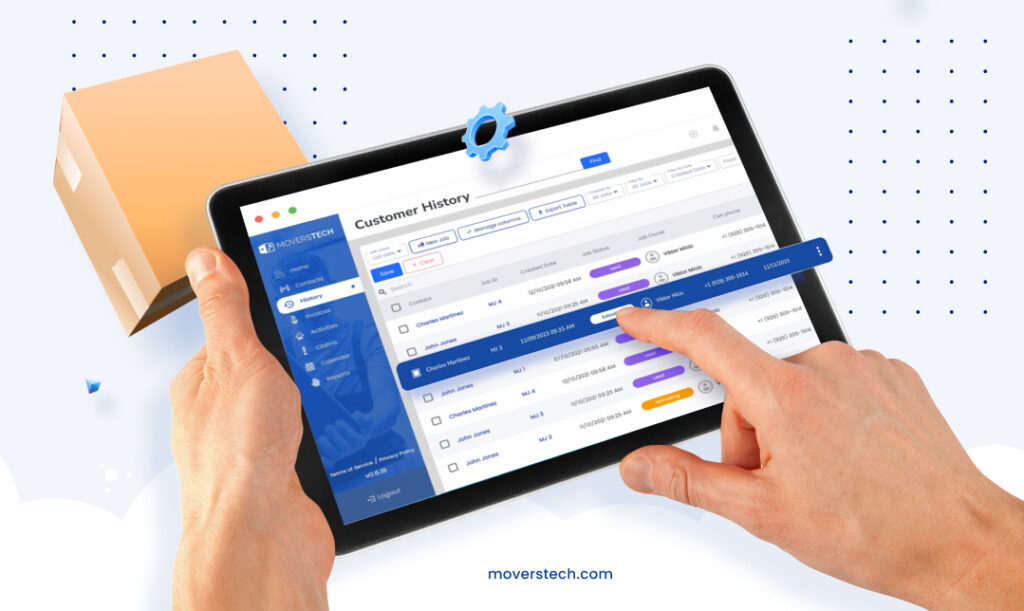Moving companies fail with CRM not because of the software, but because it is not integrated into real daily operations. Poor planning, weak onboarding, dirty data, low team adoption, and lack of accountability are the main barriers. CRM success improves when the system replaces spreadsheets, supports sales and dispatch workflows, and is used consistently by office staff and crews.
Using a CRM is now common in the moving industry. Yet many moving companies still struggle to achieve CRM success. Owners often expect fast results, but daily operations are complex. Dispatching crews, sending estimates, following up on leads, and managing schedules all happen at once. On top of that, many movers rely on third party lead providers, which adds pressure to respond fast. Missed follow-ups or small scheduling gaps can easily lead to lost jobs. While some companies see terrific ROI on their CRM integration, others hit clear barriers to CRM integration. The issue is not the system itself. It is how CRM integration fits into real moving operations, not just contact storage.

Common barriers to CRM success
Understanding the most common barriers to CRM success helps you avoid problems before they affect daily operations. CRM integration is rarely simple, especially for moving companies handling multiple crews, active estimates, and fast-changing schedules. Even smaller movers can struggle if the system does not match how work actually gets done. Quality CRM integration requires more than choosing software and turning it on. You need to know where the CRM fits into sales, dispatch, and customer communication. When that connection is unclear, CRM integration often feels forced instead of helpful, which limits long-term CRM success.
- Lack of planning
- Subpar introduction
- Using dirty data
- Lack of employee motivation
- Neglecting long-term goals
- No accountability
Lack of planning
A CRM system can support many parts of a moving business. It can help manage customers, support sales teams, and even function as moving leads software. However, one of the most common barriers to CRM success appears before the system is ever selected. That barrier is poor planning. Many moving companies adopt a CRM without clearly defining how it will support estimates, dispatch, follow-ups, or reporting. Without that clarity, CRM integration is unfocused and expensive. Planning should include clear goals, budget limits, and input from people who handle daily operations. When planning is rushed or skipped, CRM integration struggles to deliver consistent results.
Subpar introduction
Another frequent barrier to CRM success is how the system is introduced to the team. Moving company owners often spend weeks reviewing CRM options and assume the system will feel intuitive to everyone else. In practice, office staff, dispatchers, and sales reps all use the CRM differently. Without proper guidance, CRM integration feels confusing instead of helpful. A rushed rollout creates frustration and inconsistent usage. Even a simple system needs clear instructions, real examples, and ongoing support. When teams do not fully understand how the CRM fits into daily work, CRM success becomes harder to reach,h and adoption slows.

Using dirty data
Dirty data is another major barrier to CRM success. This includes outdated contacts, incomplete estimates, and incorrect customer details. Many moving companies bring old spreadsheets and past jobs into a CRM without reviewing them first. When systems act as customer care software for movers, they rely heavily on accurate information. If the data is flawed, scheduling errors, pricing mistakes, and missed follow-ups become common.
Poor data also affects future reporting because new entries build on existing records. Regular data cleanup helps prevent these issues. Cleaning surveys, inventories, and lead records early supports smoother CRM integration and more reliable day-to-day operations.
Lack of employee motivation
A lack of employee motivation is a common barrier to CRM success, especially in moving companies. Owners may see the value of CRM integration right away, but office teams, estimators, and crew leaders often see it as extra work. A new system changes routines, and that resistance can slow adoption. If employees do not understand how the CRM helps reduce repeat tasks or prevent mistakes, usage drops. Clear communication matters. Showing how CRM integration saves time, improves coordination, and helps teams engage with the system. This supports long-term CRM success.
Neglecting long-term goals
Many moving companies adopt a CRM to solve immediate problems, but overlooking long-term goals becomes a serious barrier to CRM success. CRM integration is not only about storing contacts or sending estimates. A well-planned system, such as a CRM for moving companies, supports sales tracking, marketing follow-ups, and customer retention over time. When owners stop engaging with the system after setup, important features go unused. This limits insight into performance and growth. Planning for future needs helps CRM integration stay relevant and supports consistent CRM success as the business scales.

No accountability
Without clear ownership, accountability becomes another barrier to CRM success. When no one is responsible for monitoring CRM integration, small issues quickly grow. Missed follow ups, incomplete records, and inconsistent usage often go unnoticed. Moving companies benefit when managers, dispatch leads, or sales supervisors take responsibility for how the system is used. This includes checking data quality, reviewing workflows, and addressing problems early. Clear accountability keeps CRM integration aligned with daily operations and helps maintain steady CRM success instead of short-term gains.
Barriers to CRM success for moving companies (and how to solve them)
Beyond the general challenges of CRM adoption, moving companies face a set of operational issues that directly affect barriers to CRM success. Daily work involves fast lead response, crew coordination, changing schedules, and tight margins. When CRM integration does not reflect these realities, the system quickly feels disconnected from real operations. The following examples focus on common breakdowns inside moving companies and explain why CRM success depends on setup, consistency, and daily use across sales, dispatch, and office teams.
- Inconsistent lead intake from third-party lead providers
- Lack of follow-up automation for quotes
- Dispatch chaos during peak moving season
- Movers and crews are not using the CRM in the field
- Job statuses are not being updated after completion
- Poor data coming from surveys, estimates, or inventories
- No visibility into sales rep performance
- Difficulty tracking repeat and referral customers
- Office teams relying on spreadsheets instead of CRM workflows
Inconsistent lead intake from third-party lead providers
Inconsistent lead intake is a frequent barrier to CRM success for moving companies that rely on third-party lead providers. Without a centralized lead management system, inquiries slip through gaps, response times increase, and CRM integration breaks before follow-up even begins. Leads may arrive by email, text, or portal and never reach the CRM in time. When intake is delayed or handled manually, follow-ups slow down, and jobs are lost. A clear process for capturing every inquiry helps stabilize daily operations and supports reliable CRM success from the very first contact.
Lack of follow-up automation for quotes
Slow or missed follow-ups create another major barrier to CRM success. Moving companies often send estimates but rely on manual reminders to follow up. During busy periods, those reminders get overlooked. Without automated follow-up tied to quotes, potential customers move on. CRM integration should support timely responses without constant manual effort. When follow-up is inconsistent, CRM success drops because strong leads never turn into booked jobs.

Dispatch chaos during peak moving season
Peak season exposes serious barriers to CRM success in moving companies. Dispatchers juggle trucks, crews, and time windows while handling last-minute changes. Many teams try to manage this volume manually, but structured dispatching and workflow automation help reduce conflicts, improve visibility, and keep schedules aligned during high-demand periods. When schedules are tracked outside the CRM, double bookings and delays become common. Manual boards and spreadsheets cannot keep up with volume. Poor visibility into availability weakens CRM integration and creates daily stress during peak season, making consistent CRM success difficult to maintain.
Movers and crews are not using the CRM in the field
During active moves, crews focus on timing, access issues, and protecting items. CRM usage often feels secondary. When job details, notes, or change requests are not logged on site, the office operates without full visibility. Dispatchers may not know a job ran long, and sales teams miss context for follow-ups. These gaps weaken CRM integration and slow coordination. Over time, this disconnect becomes one of the most damaging barriers to CRM success, especially for companies managing multiple crews at once.
Job statuses are not being updated after completion
After a move is finished, many teams move straight to the next job without updating the system. When job statuses remain open or incomplete, invoices get delayed, and follow-ups fall through. Reviews and referral requests are often missed. These gaps limit visibility and reduce operational control. CRM integration depends on accurate status updates to trigger next steps. When completion data is ignored, it quietly becomes one of the recurring barriers to CRM success in daily moving operations.

Poor data coming from surveys, estimates or inventories
Surveys, estimates, and inventories feed critical information into daily operations. When these inputs are rushed or incomplete, pricing errors and scheduling issues follow. Missing stair details, incorrect cubic footage, or unclear access notes create problems on move day. CRM integration relies on this data to support planning and communication. Weak input quality reduces trust in the system and increases manual work. Over time, inaccurate intake turns into one of the hidden barriers to CRM success for growing moving companies.
No visibility into sales rep performance
Sales activity drives bookings, but many moving companies lack clear insight into how reps actually perform. Calls, response times, and close rates often live outside the CRM or are not tracked at all. Without that visibility, coaching becomes guesswork, and strong leads may be mishandled. CRM integration should make performance easy to review, not harder to find. When sales data stays fragmented, it slowly adds to the barriers to CRM success and limits informed decision-making.
Difficulty tracking repeat and referral customers
Repeat and referral customers are a major source of steady revenue, yet they are often overlooked. Past jobs sit in the system with no clear tagging or follow-up process. Office teams rely on memory instead of data. CRM integration should connect past moves to future opportunities, but that only works when records are complete and easy to access. Losing track of these relationships weakens long-term growth and becomes another barrier to CRM success.
Office teams relying on spreadsheets instead of CRM workflows
Spreadsheets feel familiar, but they create duplicate work and version issues. Many office teams update sheets first and the CRM later, if at all. This breaks workflows and causes confusion between departments. CRM integration only works when it replaces manual tools, not when it competes with them. Relying on spreadsheets keeps processes fragmented and reinforces everyday barriers to CRM success.
Treat CRM as part of daily operations, not a side tool
CRM systems can support real growth, but only when they reflect how moving companies actually operate. Dispatch, sales, crews, and office teams all interact with the system in different ways. Ignoring those realities leads to repeated barriers to CRM success. Strong CRM integration requires planning, ownership, and consistent daily use. When companies recognize these challenges early and address them with care, CRM success becomes achievable and sustainable instead of frustrating and short-lived.
Frequently Asked Questions
Why do many moving companies struggle with CRM success?
Most struggles come from poor planning, weak onboarding, and low daily adoption. The CRM is often treated as a contact database instead of a core operations tool for sales, dispatch, and follow-ups.
Is the problem usually the CRM software itself?
No. The issue is rarely the system. Problems arise when CRM workflows do not match real moving operations like lead intake, scheduling, crew coordination, and job tracking.
How does dirty data affect CRM performance?
Inaccurate or incomplete data leads to missed follow-ups, pricing errors, scheduling conflicts, and unreliable reporting, which reduces trust in the CRM and limits its value.
What is the biggest factor for long-term CRM success?
Consistent daily use with clear ownership. When teams rely on the CRM instead of spreadsheets and managers actively monitor usage, CRM integration becomes effective and sustainable.

